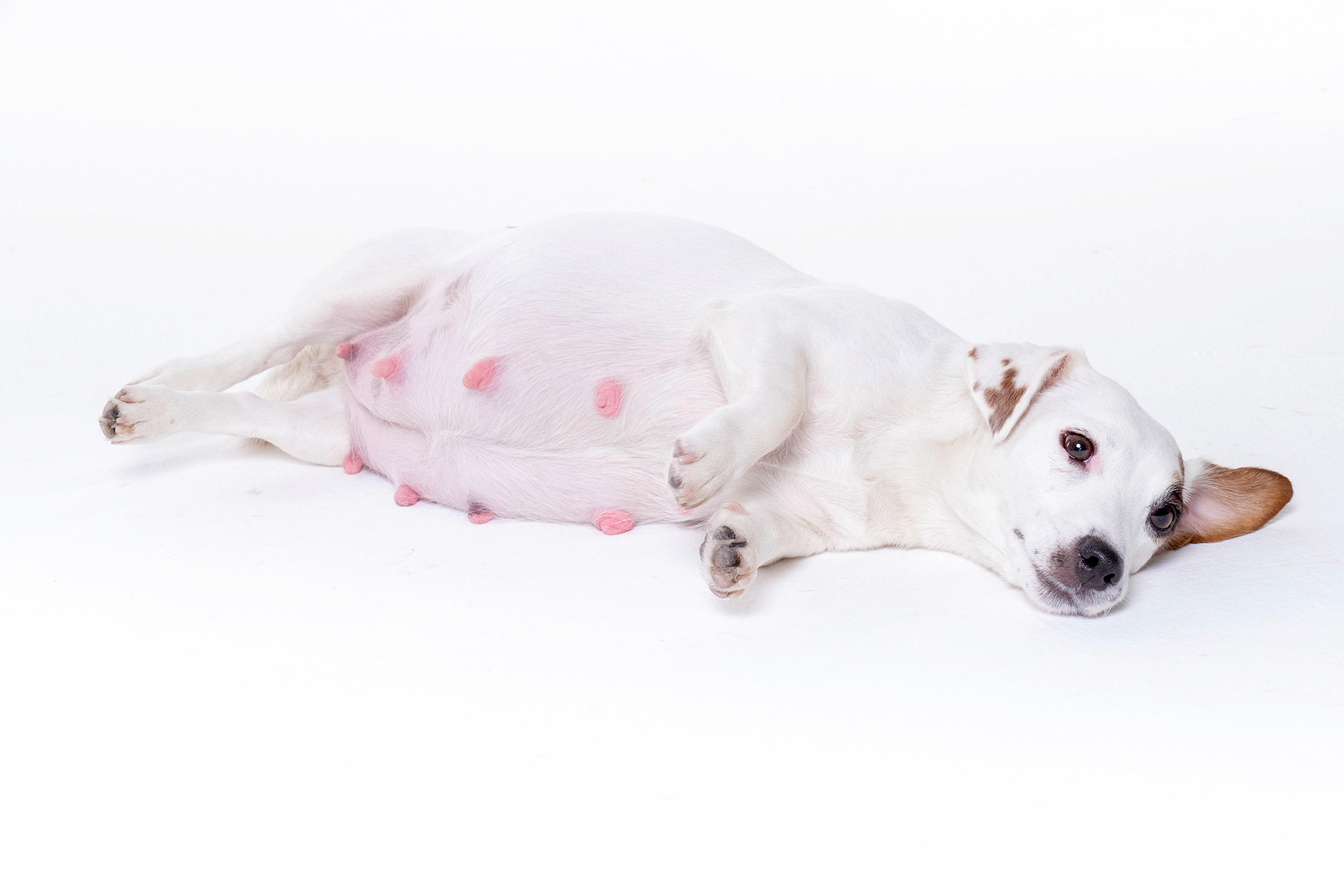If you’re the owner of a pregnant dog, it’s important to provide her with the proper care during her pregnancy. In this blog post, we will discuss everything you need to know about pregnant dog care. We’ll cover topics such as nutrition, exercise, and prenatal vitamins. We’ll also talk about birthing and caring for newborn puppies. So if you’re worried about how to take care of your pregnant dog, don’t worry – we’ve got you covered!
Dog Pregnancy Signs and symptoms
- Weight gain
- Swollen belly
- Enlarged nipples
- Increase in appetite
- Increased urination
- Tires more easily
- Irritability
- Vomiting (in the first few weeks)
In the early stages of pregnancy, it can be difficult to tell whether your dog is pregnant or not. However, there are a few key signs and symptoms to look out for. The most common sign of pregnancy is a swollen belly, but other signs include enlarged nipples and increased urination. If you suspect that your dog is pregnant, we recommend taking her to the vet for confirmation.
Once your dog reaches the final stages of pregnancy, you will likely start to see movement in her stomach. This is the result of the puppies moving around inside her womb. You may also notice that your dog’s appetite increases as she gets closer to giving birth.
During your dog’s pregnancy, here’s what you can expect
The pregnant dog’s pregnancy typically lasts around 63 days, although it can vary from dog to dog. During the pregnancy, you will need to make a few changes to your dog’s diet and exercise routine.
Your pregnant dog will require more food than usual. Initially, She will need about 25% to 50% more calories than she did before she became pregnant. Be sure to provide her with a high-quality diet that is specifically designed for pregnant dogs.
Your pregnant dog should also get plenty of exercise. However, you will need to adjust her exercise routine as her belly gets bigger. Avoid strenuous activities such as running and jumping. Instead, stick to low-impact exercises like walking and swimming.
Prenatal vitamins are also important for pregnant dogs. Be sure to give your dog a multivitamin supplement that contains all the essential nutrients for pregnant dogs.
Finally, be prepared for the birth of your pregnant dog’s puppies. In most cases, the first puppy should be delivered within 1 to 2 hours of the onset of contractions and straining.
There is typically a 30-minute gap between the birth of two puppies. Sometimes it may take up to one hour.
so it’s important to have everything ready beforehand. Make sure you have a warm place for your pregnant dog to give birth, as well as plenty of food and water for the puppies once they are born.
Nutrition and diet for pregnant dogs
A pregnant dog needs a balanced and nutritious diet to ensure the health of both herself and her puppies. During pregnancy, a pregnant dog should eat more food overall, as well as more protein, carbohydrates, and fat. A pregnant dog’s diet should also include plenty of essential vitamins and minerals, such as iron, calcium, and zinc.
The best way to ensure that your pregnant dog is getting the right nutrients is to feed her a high-quality diet specifically designed for pregnant dogs. There are many different brands of pregnant dog food available, so be sure to do your research and find the one that is best for your dog.
In addition to good pregnant dog food, you can also give your dog supplemental vitamins and minerals. This can be especially helpful if your pregnant dog is not getting enough nutrients from her regular diet. There are many different prenatal vitamin supplements available for pregnant dogs, so be sure to ask your veterinarian for advice on which ones are best for your pet.
Exercise for pregnant dogs
Exercise is important for dogs during pregnancy, but you will need to adjust her routine as her belly gets bigger. Avoid strenuous activities such as running and jumping. Instead, stick to low-impact exercises like walking and swimming.
As your pregnant dog’s belly grows, you may need to help her with some of her exercises. For example, if she is used to walking long distances, you may need to carry her for part of the way. Or if she enjoys swimming, you may need to provide her with a floatation device to help support her weight.
Remember, it’s important to listen to your pregnant dog’s body and let her dictate how much exercise she needs. If she seems tired or doesn’t want to exercise, then don’t force her. Just let her rest and enjoy the pregnancy!
Prenatal vitamins for pregnant dogs
Just as pregnant women need to take prenatal vitamins to ensure the health of their unborn babies, pregnant dogs also need to take prenatal vitamins. This is because pregnant dogs require a lot of essential nutrients, such as iron, calcium, and zinc, to stay healthy.
There are many different prenatal vitamin supplements available for pregnant dogs. Be sure to ask your veterinarian for advice on which ones are best for your pet. Some good options include:
– Iron supplement: An iron supplement is important for dogs during pregnancy because they are at risk for anemia.
– Calcium supplement: A calcium supplement is important for dogs during pregnancy because they need plenty of calcium to build strong bones and teeth for their puppies.
– Multivitamin supplement: A multivitamin supplement is important for dogs during pregnancy because it provides them with all the essential nutrients they need.
Birthing and delivery process
As your pregnant dog approaches delivery, it’s important to begin preparing for the arrival of the puppies. You will need to set up a designated area where she can give birth, and you should purchase some puppy supplies such as food and water bowls, toys, and bedding. In most cases, pregnant dogs will deliver their puppies naturally without any problems. However, if you notice any abnormal symptoms such as bleeding or discharge, please contact your veterinarian immediately.
When it comes time for a pregnant dog to give birth, there are a few things you need to know to provide her with the best possible care. The birthing process can take anywhere from a few hours to a few days, so be prepared for anything!
The first thing you’ll need to do is make sure you have a warm place for your pregnant dog to give birth. This could be a special birthing room, or simply a warm spot in your home. Make sure the area is quiet and free of distractions, and have plenty of food and water available for the mother and puppies.
During labor, your pregnant dog will likely be restless and panting. She may also start licking her vulva or pacing around. When the puppies are born, they will be wet and slimy, and will probably not weigh very much (around 2-5 ounces). It’s important to keep them warm and dry and to make sure they are nursed by their mother as soon as possible.
Newborn puppies require around-the-clock care for the first few weeks of their lives. This includes feeding every two hours, cleaning their umbilical cords, and checking their temperature. Puppies that are not cared for properly can die within the first week of life, so it’s important to make sure you are up for the challenge of caring for newborn puppies!
Caring for newborn puppies
Once the puppies are born, it’s your responsibility to care for them until they are old enough to be adopted into new homes. This includes feeding them regularly, keeping them clean, and socializing them with humans and other animals. It can be a lot of work taking care of newborn puppies, but it’s worth it!
It’s important to provide newborn puppies with the proper care to ensure their health and survival. This includes feeding them every two hours, cleaning their umbilical cords, and checking their temperature. It’s also important to make sure they are nursed by their mother as soon as possible.
Newborn puppies require a lot of attention and care, so be prepared to devote a lot of time to taking care of them. If you’re not able to provide this level of care, then it may be best to find a home for your puppies with someone who can.
We hope this blog post has helped and provide you with everything you need to know about caring for newborn puppies. If you have any further questions, be sure to contact the veterinarian.

